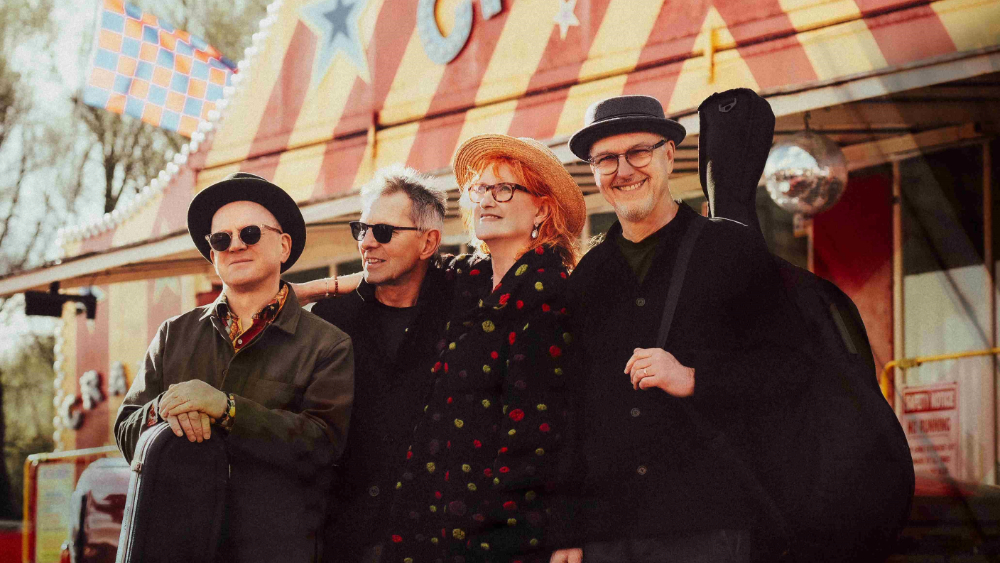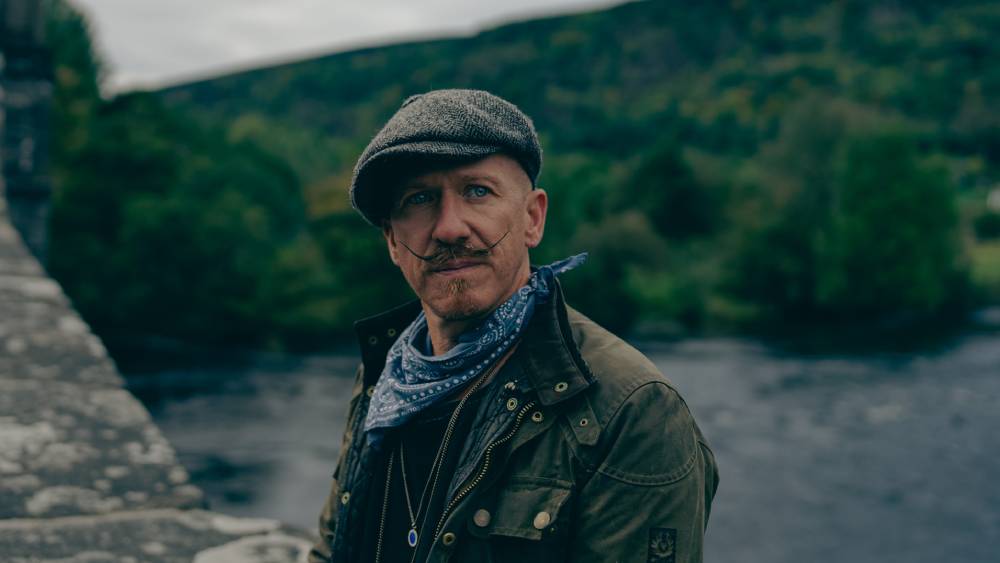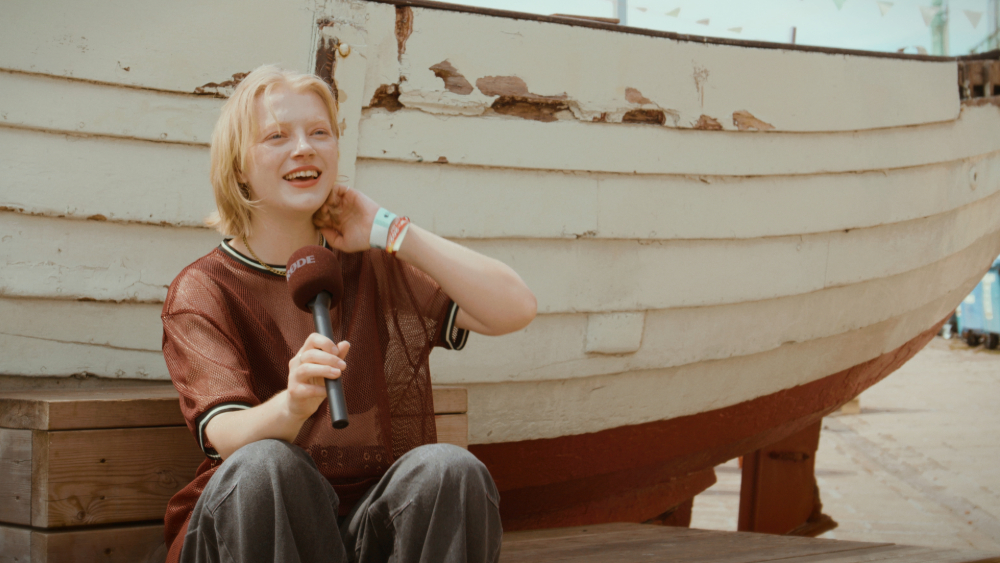One day in 2022, Thin Lizzy’s co-founder and ex-guitarist Eric Bell received a phone call from his cousin. ‘He told me he was coming home from work on the bus when he saw this mural with my face on it,’ he recalls. ‘He said, “Eric, what are you doing up there?”’
Celebrating Belfast’s rich cultural history, Eric is immortalised in the Luminaries and Legends of EastSide — a giant street artwork located in east Belfast that also features the likes of Van Morrison (one of Eric’s former collaborators), Gary Moore and George Best. His inclusion in the mural is a testament to his influential music career, and the 76-year-old is set to be celebrated further by his home city this week as part of the Northern Irish Music Prize 2024 ceremony.
Ulster Hall will witness Eric Bell become the latest recipient of the Oh Yeah Legend Award, presented by PRS for Music. Following in the footsteps of previous winners Snow Patrol, Paul Brady and ASH, the award is presented to an individual or band that has made a significant contribution to the world of music.
‘So it’s about time!’ Eric tells M with a laugh. ‘But, seriously, it’s a great honour and it’s a really nice thing to have.’
‘Van Morrison already had two hit records and toured the States by the time I joined his band — I still had a nine-to-five day job in a shirt factory!'
Eric’s musical journey began over 60 years ago when he started playing with local groups in and around the Northern Irish capital. ‘There was a bit of a scene in Belfast back then,’ he says. ‘There were lots of Irish showbands and pop groups like Teddie And The Tigers. We were all inspired by what was happening in music at the time, and for me it was The Beatles and The Rolling Stones.’
Eric landed his first semi-professional gig in September 1966 with the final incarnation of Them, the band of local hero Van Morrison. ‘Van already had two hit records and toured the States — I still had a nine-to-five day job in a shirt factory!’ he recalls. ‘He was an intense guy and out on his own, like a sort of Marlon Brando character.’
When Them broke up, Eric passed through the ranks of local groups The Earth Dwellers, Shades of Blue and The Bluebeats before auditioning for one of Dublin’s premier showbands, The Dreams.
‘To my surprise, they gave me the job,’ he continues. ‘But when I joined, I was told I’d be working six nights a week and I’d only have Mondays off. It really was like being in the army.’
Eric was with the Dreams for just over a year. It was a well-paid job but frustrating, as this was the era of Cream and Jimi Hendrix (‘much more my thing’). After seeing fellow Belfast boy Gary Moore’s new band Skid Row, Eric realised something had to change: ‘I thought, “What am I doing in a showband? I’ve got to get out of here.”’
'When I joined The Dreams, I was told I’d be working six nights a week. It really was like being in the army.’
Eventually, he saved enough money to hand in his notice. ‘I left the Dreams with no idea what to do next,’ he admits. ‘I was living in this little flat in Dublin, spending all the money I’d saved and doing bugger-all. Eventually I thought I better get out there and meet some musicians.’
One evening in December 1969, Eric made his way to a pub on Grafton Street, where many young musicians drank. ‘But I was approaching these long-haired guys with my mohair suit and showband haircut, and they all thought I was from the drugs squad,’ he laughs. ‘Nobody was interested in forming a band with me. I thought, “Oh God, I’m going to have to go back to the shirt factory.”’
Eric then paid a visit to the Countdown club where a band called Orphanage were about to perform. He went backstage during the interval and found their lead vocalist Phil Lynott and drummer Brian Downey sat on their own: ‘I thought, “Right, there’s an opportunity here to ask if they knew any good musicians.”’
Phil gave Eric some phone numbers, but then called him over just as he was about to leave: Orphanage had run its course and Lynott wanted to start a new band, Thin Lizzy. ‘Brian Downey wasn’t so keen,’ Eric remembers. ‘But little did he know — little did any of us know.’
A few days later, Phil took his reel-to-reel tape recorder to Eric’s flat and played him two of his songs: Dublin and Saga Of The Ageing Orphan.
‘What I liked about Phil’s songwriting was he told stories, and gravitated towards poetry and Irish history,’ Eric tells M about the late frontman. ‘But he also wrote these great chord sequences. When I heard his material, I could already hear my guitar in there.’
Thin Lizzy eventually signed with Decca Records, recording their self-titled debut album in a week in January 1971. ‘We didn’t have a clue,’ laughs Eric, who admits that the group and their producer, American songwriter Scott English, were stoned for most of the sessions. ‘Scott started getting my solos mixed up and putting them on the wrong tracks.’ When they were done, Lizzy’s manager arranged for freelance engineer Nick Tauber ‘to sort the whole thing out’.
Eric believes that great songwriting chemistry was crucial to Thin Lizzy and remains the cornerstone of any good band. ‘You need songs,’ he says. ‘There’s a lot of talented people out there trying to make something of themselves in music and it’s a strange territory, especially at the moment.’
‘What I liked about Phil Lynott's songwriting was that he told stories, and gravitated towards poetry and Irish history.'
Eric recorded two more albums with Thin Lizzy — Shades Of A Blue Orphanage (1972) and Vagabonds Of The Western World (1973) — while he and Phil composed several songs together. As well as The Friendly Ranger At Clontarf Castle and The Rise and Dear Demise Of The Funky Nomadic Tribes, Eric, Phil and Brian co-wrote the band’s enduring Irish Top 20 hit, The Rocker. Eric also created the memorable intro to Lizzy’s hit cover of the traditional Irish folk song Whiskey In The Jar, in which he made his guitar sound like uilleann pipes.
‘To start with, I didn’t have a clue what to do,’ he says now. ‘It was different to everything else Thin Lizzy did and was the hardest piece of music I have ever done in my life.’
Getting paid to write and play music was a challenge, though, despite their hit singles and extensive touring. ‘PRS is important, but it’s so easy when you’re a young band not to pay attention to that side of things,’ says Eric. ‘Let’s put it this way, my royalty cheques then weren’t great. I still have one upstairs for £7.85 after the management had taken their commission. I’m even thinking of getting it framed.
‘One time our manager gave us a bonus for £1500, but I never saw it,’ he laughs. ‘My first wife took the cheque and booked a holiday for the both of us with it.’
'Whiskey In The Jar was the hardest piece of music I have ever done in my life.’
Eric has just revisited those early days for Acoustic Sessions, a new 'frontline' Thin Lizzy album due for release in January. Eric added new acoustic guitar parts to Phil’s original vocals and Brian’s drums on 10 vintage Lizzy songs, including Whiskey In The Jar.
‘It threw me at first to hear these songs without my original guitar parts,’ he admits. ‘But there’s some really good tracks on it — things like Eire and Dublin.’
Eric parted company with Thin Lizzy in January 1974, going on to record three albums with Noel Redding’s band before joining saxophonist Dick Heckstall-Smith’s blues group Mainsqueeze. Since then, he’s recorded and toured with his own groups (including The Eric Bell Trio), and lived in London and Dublin before returning to his beloved Belfast. A day rarely goes by when Eric doesn’t pick up a guitar.
‘It’s part of me,’ he says. ‘You have to do it, or you lose it. People ask me, “When are you going to retire?” But why would I do that?
'The same thought comes into my head every day of my life. “What would have happened if I hadn’t gone to that club that night and met Phil Lynott?”’
You can find out more about the NI Music Prize 2024 by heading here.





